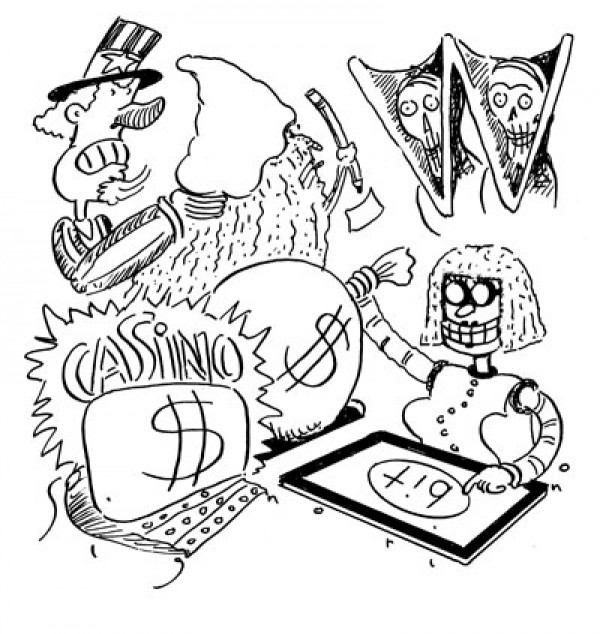
Recently, you mentioned bitcoin as being a popular medium of exchange in the deep, dark Web. A couple of friends have tried to get me to invest in bitcoin because it’s supposedly the “currency of the future.” What’s the deal? —Josh Draper
Bitcoin is a virtual currency, but that’s like saying computers add ones and zeros—you don’t get any sense of the complexity of the thing. I’ll give it a shot below. I should tell you my initial reaction was the bitcoin was an impossible techno fantasy that was certain to ruin anyone foolish enough to put their trust in it. But now, I’d say there’s a chance it’ll become the Krugerrand of our times.
Virtual currencies are familiar to those who play massively multiplayer online role-playing games, or who maintain a cyber-presence in online communities like Second Life. For the most part, these virtual currencies are divorced from the real world—you can become a virtual millionaire selling virtual real estate in Second Life and still be sleeping on your real-life mom’s real-life couch.
Bitcoins are different. They’re virtual in the sense that they exist solely in cyberspace, but they’re expressly designed for the real world—specifically, any form of commerce where anonymity and untraceability are essential. Funds can be sent digitally across borders without physical transfer or anyone looking over your shoulder, and there are no fees or international exchange rates to worry about. For these reasons, bitcoins originally appealed mainly to anarcho-utopian types, plus drug dealers, gamblers and thieves.
Once the exchange rate for bitcoins shot up in 2011, speculators got into the act, too, which I can’t say classed up the situation much, but it did put the bitcoin on the financial map. At the moment, the 11-plus million bitcoins in existence are worth roughly $1.2 billion. To be fair, bitcoins are used in a growing number of legitimate transactions, although I still wouldn’t ask the pizza guy to break one.
At a certain level of abstraction, the idea behind bitcoins isn’t that complicated:
• Transactions are peer-to-peer—that is, directly between two computers online, with no intermediary. There’s no central authority and no recourse. If bitcoins get stolen (and it’s happened), they’re gone.
• There’s nothing backing up bitcoins. Their value is dependent entirely on what people agree they’re worth.
• The system doesn’t work on trust, though. Each bitcoin includes a log of all previous transactions in which it’s changed hands. When a bitcoin is transferred between two parties, its transaction log is broadcast to all bitcoin participants. A subset of this group, called bitcoin miners, competes to perform what amounts to a validation test on the transaction log. This task requires a special high-powered computer rig to do the voluminous processing involved. Whichever miner is first to successfully validate the transaction log notifies the rest of the bitcoineurs, and the transaction is considered valid. This process takes between 10 minutes and an hour.
• For their trouble, successful bitcoin miners earn new bitcoins. That’s how bitcoins are created, ensuring the number increases slowly. Crucially, the system is designed so total coinage will top out at about 21 million. Bitcoins are thus immune to inflation.
The above omits considerable detail, for the obvious reason that if I got into the full cryptographic complexity your head would explode. Instead, let’s move on to a few meta-observations:
• One of the strengths of bitcoins, namely that their quantity is limited, is also a weakness. The money supply has to grow more or less in proportion to the underlying economy lest we have deflation and depression. Regulating the money supply is why you need central bankers, feckless though they sometimes are. For that reason, bitcoins as currently constituted will never replace government-backed money.
• That’s not to say bitcoins can’t have a role as a supplementary currency. God knows we all engage in transactions we’d just as soon no one knew about—arms trading, money laundering or trafficking in endangered species and sex slaves. To the extent bitcoins become acceptable tender for everyday commerce, we can also avoid taxation, eventually transforming our overregulated society into a paradise like Greece.
• A drawback for the time being, however, is that the exchange rate between bitcoins and conventional money fluctuates wildly. In 2013, a bitcoin started off worth around $13, shot up to $266 in the wake of the Cyprus bank crisis, dropped within a week to $68, and has since ping-ponged between there and $154. (As I write, it’s at $103.) Bitcoins, in other words, aren’t a reliable store of value but a speculative commodity, like gold. On steroids. And with gold you needn’t worry about a hard-drive crash.
• Sure, things may stabilize eventually; bitcoins have only been around since 2009. But that’s scary in itself. The tech world is full of brilliant inventions that fell by the wayside; when’s the last time you used that Zip drive? Another worry: the bitcoin realm gets hacked, although it’s proven resistant thus far.
Me, I’m confident bitcoins will never become worthless. I’ll bet you a million BTC.
Send questions to Cecil via StraightDope.com or write him c/o Chicago Reader, 350 N. Orleans, Chicago 60654.